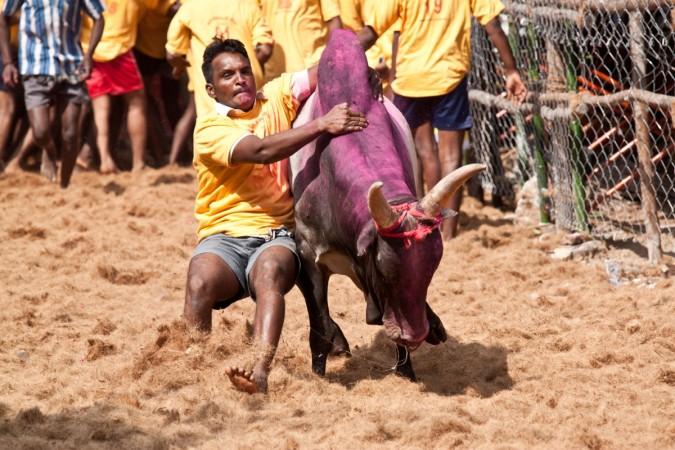
Tamil Nadu Chief Minister O Panneerselvam shot off a letter to Prime Minister Narendra Modi urging him to revoke the ban Jallikattu in the state by passing an ordinance to ensure that the traditional sport, which is part of Pongal celebrations in the state, is allowed.
"Given that Pongal festival, which holds great importance to the people of Tamil Nadu, is less than a week away and Jallikattu is an integral part of the Pongal festivities, and considering the urgency of the issue, Government of India should consider promulgating an ordinance removing the legal impediments, enabling the conduct of Jallikattu during Pongal, 2017," Panneerselvam wrote in the letter.
The Supreme Court had banned the sport in Tamil Nadu on May 7, 2014 following severe backlash from animal rights activists. However, the Ministry of Environment and Forests allowed the sport to continue under certain conditions thereby ending the ban on January 8, 2016. But the apex court issued a stay on the sport on January 12, 2016, after hearing petitions by the Animal Welfare Board of India and then refused to lift the stay.
What is Jallikattu ?
Jallikattu, also known as Eruthazhuvuthal or Manju Virattu, is held in Tamil Nadu during the festival of Pongal. The sport, which is an integral part of the festivities in the state, was believed to be a common practice during the classical period (400-100 BC) in Tamil Nadu.
The bulls are well-fed and are bred by the villagers before the event and attended mostly by several temple bulls in the villages. A temple bull is the head of all cattle in a village for whom special rituals are performed on important days.
After the event is over, tamed weak bulls are used for domestic activities and agriculture while the strong ones are used for breeding.
There are three versions of Jallikattu:
- Vadi Manju Virattu – This version is organised mostly in the districts of Madurai, Pudukkottai, Theni, Tanjore, and Tiruchirappalli. The bull is released onto the field through an opening in the enclosure following which an individual clings to the hump of the bull. The person has to cling to the hump for a specified period of time to win the prize. Only one individual can attempt at clinging to the bull.
- Vaeli Virattu – This version is organised mostly in the districts of Sivagangai, Tiruchirappalli, Manamadurai and Madurai. The bulls are not restricted in any manner and are free to run in any direction once released. Many do not come close to any humans. Most of the bulls just keeps its position and attack any person who comes near them. They play around for a few minutes to several hours thereby entertaining the crowd.
- Vadam Manjuvirattu – "Vadam" is the Tamil word for rope. The bull is tied to a 50-foot-long rope and is free to move within this space. A team of seven or nine members try to control the bull within 30 minutes. This is the safer version of the game since the bull is tied to a rope and there are barricades put up to protect the audience.
How are the Jallikattu bulls trained ?
The calves chosen for the sport will be fed a healthy and nutritious diet so that they grow into strong, well-developed bulls. They are also taken to the events once they reach adolescence to give them a feel of the atmosphere. Vadam Manjuvirattu bulls are given special training so that they understand the restraints of the rope.
Why was Jallikattu banned ?
Animal activists, the FIAPO (Federation of India Animal Protection Agencies) and PETA India had been protesting against Jallikattu since 2004.
The Animal Welfare Board of India had also filed a case in the Supreme Court seeking a complete ban on Jallikattu because of the cruel treatment meted out to animals and also over the threat it pose to public safety. There are human injuries and fatalities involved due to which the Board sought a ban on the sport. Several bulls suffer injuries believed to be a bad omen for the village.
The apex court ruled in favour of the ban on Jallikattu and bullock cart racing in the state saying that even bulls have rights against torture.
"Forcing a bull and keeping it in the waiting area for hours and subjecting it to the scorching sun is not for the animal's well-being. Forcing and pulling the bull by a nose rope into the narrow, closed enclosure or 'vadi vassal' (entry point), subjecting it to all forms of torture, fear, pain and suffering by forcing it to go the arena and also over-powering it in the arena by bull tamers, are not for the well-being of the animal," the bench had said.
The bench added that the Animal Welfare Board of India had also provided details on the ways in which the sport was organised saying that the torture and cruelty meted out to the bulls was unimaginable. "Being dumb and helpless, they suffer in silence," it said. The court also said that cruelty towards the animal is obvious because they are not suited for such activities. Forcing them to participate in such events is making them go through unnecessary pain.
The Bench, comprising Justices Dipak Misra and RF Nariman, said that humans did not have the right to negate their obligation just because animals cannot speak for themselves. "We cannot import Roman Gladiator type sport here. One can use computer for indulging in bull fighting. Why tame bulls for it," the bench said.









